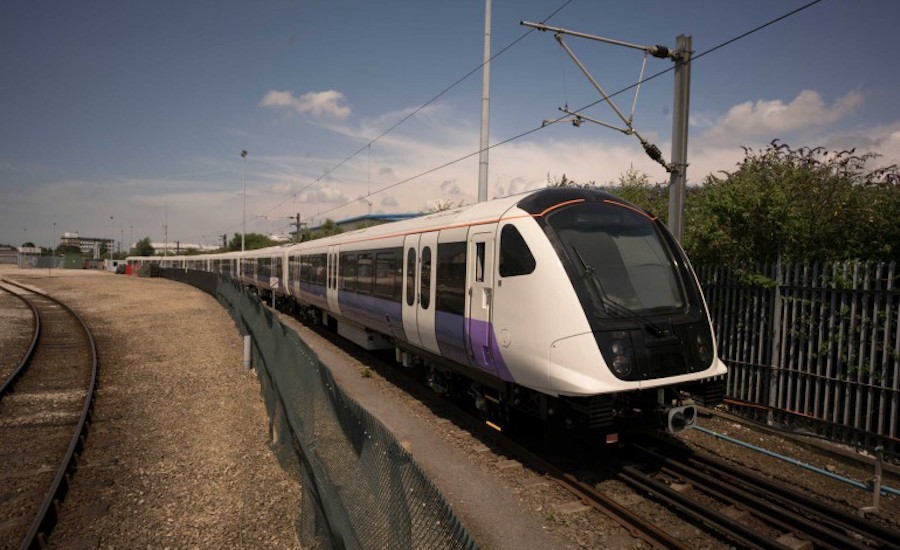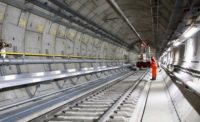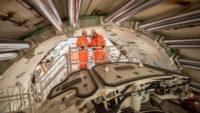The UK government and the company behind the country’s troubled HS2 high speed railroad failed to accurately assess the program’s complexity and risk, leading to huge cost hikes and schedule delays, says a Jan. 24 oversight report.
The program’s official projected cost has already risen to $115 billion (2015 prices), 58% above budget. But it “is still at an early stage, and costs are uncertain and could change,” says the report. The project’s final completion date, now seen as late as 2040, would be seven years behind deadline.
Since the government set the project’s first-phase London to Birmingham section budget in 2015, based on 2013 outline designs, the cost of all elements except rolling stock have risen. The currently official upper forecast $52 billion cost now is $16.9 billion more than available funding.
Project company HS2 Ltd.’s inadequate first-phase funding contingency of $9.2 billion was set in 2017 using calculations “not appropriate” for a program at such an early stage, says the National Audit Office report. Design specifications committed during the Parliamentary permitting phase “may also restrict contractors’ ability to avoid costs … and increase the challenge of delivering the railway,” it adds.
HS2 Ltd. and UK agency Dept. for Transport now claim greater confidence about Phase One costs. But main construction has not started and about half of the estimate is based on contracts with appointed civil engineering contractors that have yet to be signed. The rail program’s second-phase section, from Birmingham to Manchester and Birmingham to Leeds, is much less developed than Phase One and already is breaking budgets and deadlines, says the report.
'Transparent and Realistic'
To ensure public trust, the transport agency and HS2 Ltd. “must be transparent and provide realistic assessments of costs and completion dates” as the program develops, recognizing the many remaining risks to the railway’s successful delivery,” says audit office head Gareth Davies.
Even in the absence of clarity from the government, CEOs of leading construction industry firms and other business sector chief want HS2 built.
In a Jan. 15 letter to Prime Minister Boris Johnson as he weighs a response to government assessments on whether the line should be built, about 26 building sector firms and groups—from AECOM and Balfour Beatty to Vinci and WSP—said the project "will be the symbol of an outward-looking Britain that unites our regions and shows that the UK is open for business. It will unlock significant growth, investment and prosperity along the entire route."
The CEOs also say the project will create 30,000 jobs and 2,000 apprenticeships with needed and exportable skills to develop :modern methods of construction" that "will help the UK further strengthen its economy post-Brexit. Indeed, it has already led to record levels of foreign direct Investment" into England's West Midlands region.
The Railway Industry Association also is impatient for work to start. “HS2 is vital for the UK …already generating thousands of jobs,” says CEO Darren Caplan. “The knock-on effects of scaling back or cancelling HS2 in the north would be significant,” claims Tim Wood, at Transport for the North, set to jeopardize “thousands of extra train journeys each year and the regional growth plans built around HS2 arriving.”
HS2’s budget remains far from certain, even though HS2 Ltd. (has already spent billions of pounds in preparation, including demolishing several large office blocks around the London Euston terminal.
The eventual three-phase HS2 program will include a planned final phase to will extend the system to Manchester and Leeds.
Trouble Signs
The official government project budget of $73 billion for the whole program began to look inadequate after contracts were awarded for the first phase's main civil works. A separate independent report claims the cost will reach $140 billion and could climb even higher after work begins.
Working to the official 2015 budget, HS2 Ltd. named preferred bidders for phase one civil work in July 2017, requiring them to complete by the end of 2018 enough design to agree target prices and then sign design-build contracts.
Meanwhile, HS2 Ltd.'s new chairman, Allan Cook, announced last summer that “the budget and target schedule for the program have proved unrealistic, while at the same time the benefits have been understated.”
Cook advised that work on the London-Birmingham first phase should continue, although costs would likely rise from $35 billion to $47 billion-$50 billion at 2015 prices. The likely completion would be two to five years later than now set. Cost of the whole program, he forecast, would reach $94 billion-$102 billion, as much as a third over official estimates.
Following those revelations, last August the Dept for Transport launched a review and appointed 80-year-old veteran engineer Douglas Oakervee as chair. He was the first of four engineers to chair HS2 in the six years since its start. Appointed in 2012, Oakervee previously chaired London’s Crossrail project between 2005 and 2009.
Blame Game
Due to be completed last fall, Oakervee’s report has yet to be published. However, a leaked draft to a UK newspaper indicated his support for continuing the program.
Now, however, a minority report from Oakervee's team challenges the review’s conclusion and questions its independence.
Since the review secretariat was “drawn largely from [Dept. for Transport] officials, some of whom were previously working on HS2, it is difficult to argue that the review was ‘independent’,” notes Tony Berkeley, who was deputy chair of the review team.
Himself a veteran civil engineer who sits in the House of Lords, Berkeley is a longstanding critic of HS2. “If the government wanted a really independent report, they should have a chairman with no history on the project,” he says.
Berkeley complains that Oakervee completed the report after the rest of the review team had been "stood down" last October.
Feeling powerless to influence the conclusions he wrote to Oakervee, Berkeley told him he planned to produce a minority opinion.
A 71-page 'minority report' released in early January asserts that the benefit-cost ratio of the HS2 program is less than 1 so it does not represent good value for money.
Berkeley reaches that conclusion by citing work done by Birmingham-based consultant Michael Byng, which put the whole program's cost at $140 million, including land and real estate acquisition.
Cutting Costs
Byng uses an estimating method recognized by national railroad infrastructure Network Rail; while government officials dispute the figures, “they haven’t come up with their own,” says Berkeley. “They are hiding behind non-disclosure agreements.”
Berkeley claims that costs could be reduced by about $26 billion by trimming the “unnecessarily high and expensive” specification, slowing travel speeds from 360 km per hour and cutting the number of transits from the current 18 per hour each way.
Another $10 billion could be saved by putting the London terminal at Old Oak Common, avoiding highly urban areas in the roughly 10-km distance to Euston Station, the officially preferred option.
These observations concur with recommendations last year from a parliamentary investigation.
HS2 costs “do not appear to be under control,” reported the House of Lords economic affairs committee. It was surprised that the government had not carried out “a proper assessment of proposals to reduce [costs] … such as lowering the speed of the railway or terminating in west London rather than Euston.”
Berkeley has had no direct response from the government, although a transport department spokesman noted that Oakervee’s review was intended to “provide advice on how and whether to proceed with HS2, with an independent panel representing a range of viewpoints.”
Berkeley’s report “represents his personal view,” the spokesman said.
Musical Chairs
Even before permanent construction on HS2 begins, the project’s rapid chairman turnover risks loss of “collective memory,” suggests Berkeley.
Appointed chairman in 2012, Oakervee was replaced in 2014 by David Higgins, who had made his name in the U.K. as CEO of the company that successfully procured infrastructure and venue design and construction for the 2012 London Olympic Games. Following Higgins in 2018 was Terry Morgan, who was also to continue acting as chair of Crossrail but was forced to quit both posts at the end of 2018, after project delays and cost overruns became known.
He was replaced by Cook, who had chaired design firm WS Atkins plc., among other companies previously.
Crossrail's Woes
Meanwhile, the team behind the also budget-busting Crossrail line strives to reach the now $24-billion project’s elusive completion
Facing nightmarishly complicated software development, Crossrail’s opening date could now slip to fall 2021, concedes Mark Wild, CEO of project company Crossrail Ltd., which is jointly owned by government agencies Transport for London and the Dept. for Transport.
Dubbed the Elizabeth Line, Crossrail will link networks on either side of London with 21 km of new twin tunnels through the center. Sections of line outside of the center are already in partial operation, but the tunneled portion has already missed its December 2019 opening deadline.
Crossrail’s software must not only manage three separate train signaling technologies, but also safety and other systems. Wild cites as one example the need to integrate 17,000 smoke detectors with 20,000 public address speakers to ensure rapid escape from anywhere on the line in case of fire.
The project’s Canadian and German software suppliers have 1,500 staff working at 22 locations globally in the “biggest software push (for railroads) in the world,” adds Wild.
System problems have been largely resolved in theory, but “it’s highly uncertain till you start testing properly,” he says. Train trials will start between this July and October, he expects.
Despite uncertainties, "we've got to the bottom of what needs to be done," Crossrail Chairman Tony Meggs recently told the London Assembly’s transport committee. And with the final cost more than 20% above the 2010 budget, the project is not expected to need any more money, according to Mark Brown, London’s Commissioner for Transport.





Post a comment to this article
Report Abusive Comment